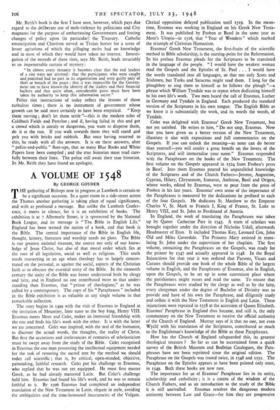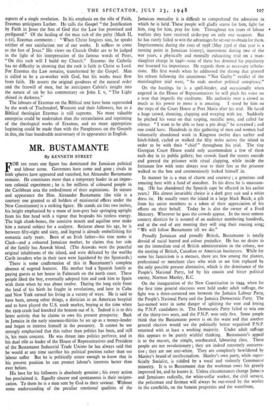A VOLUME OF 1548
By GEORGE GOYDER
THE gathering of Bishops now in progress at Lambeth is certain to be a significant occasion. In a quiet room in a side-street across the Thames another gathering is taking place of equal significance, and with as profound a message. But unlike the Lambeth Confer- ence, it meets in silence, for it is an exhibition of books. The exhibition is at 7 Albemarle Street, it is sponsored by the National Book League, and its message is "The Bible in English Life." England has been termed the nation of a book, and that book is the Bible. The central importance of the Bible in English life, thought, history, literature and worship needs no gloss. The Bible is our greatest national treasure, the source not only of our know- ledge of Jesus Christ, but also of that moral order which lies at the root of all legislation, social as well as religious. This truth needs reasserting in an age when theology has so largely concen- trated on the personal, as against the social, aspects of the Christian faith as to obscure the essential unity of the Bible. In the sixteenth century the unity of the Bible was better understood both by clergy and laity, and in England no one contributed more to that under- standing than Erasmus, that " prince of theologians," as he was called by a contemporary. The copy of his " Paraphrases " included in the Bible exhibition is as valuable as any single volume in that remarkable collection.
The story begins in 1499 with the visit of Erasmus to England at the invitation of Mountjoy, later tutor to the boy king, Henry VIII. Erasmus meets More and Colet, makes an immortal friendship with the one and finds his life's work with the other. It is with the latter we are concerned. Colet was inspired, with the zeal of the humanist, to discover the actual words, the thoughts, the reality of Christ. But first the accretions and irrelevancies of centuries of scholasticism must be swept away from the study of the Bible. Colet recognised in Erasmus the one man possessing the intellectual equipment needed for the task of restoring the sacred text by the method we should today call scientific ; that is, by critical, open-minded, objective, painstaking, faithful research. Colet put his challenge to Erasmus, who replied that he was not yet equipped. He must first master Greek, as he had already mastered Latin. But Colet's challenge held him. Erastfius had found his life's work, and he was to remain faithful to it. By 1506 Erasmus had completed an independent translation of the New Testament in Latin, elegant in style, avoiding the ambiguities and the time-honoured inaccuracies of the Vulgate. Clerical opposition delayed publication until 1519. In the mean- time, Erasmus was working in Engla,nd on his Greek New Testa- ment. It was published by Froben at Basel in the same year as More's Utopia—in 1516, that " Year of Wonders " which marked the triumph of Christian Humanism.
Erasmus' Greek New Testament, the first-fruits of the scientific method in Bible scholarship, is the starting-point-for the Reformation. In his preface Erasmus pleads for the Scriptures to be translated in the language of the people. " I would have the weakest woman read the Gospels and the Epistles of St. Paul . . . I would have the words translated into all languages, so that not only Scots and Irishmen, but Turks and Saracens might read them. I long for the ploughboy to sing them to himself as he follows the plough "—a phrase which William Tyndale was to repeat when dedicating himself to his own life's work. Two men heard the call of Erasmus, Luther in Germany and Tyndale in England. Each produced the standard version of the Scriptures in his own tongue. The English Bible as we know it is substantially the work, and its words the words, of Tyndale.
Colet was delighted with Erasmus' Greek New Testament, but not yet satisfied. He writes to him, " Do not stop, Erasmus. Now that you have given us a better version of the New Testament, illustrate it also with expositions and full commentaries on the Gospels. If you can unlock the meaning—as none can do better than yourself—you will confer, a great benefit on the lovers of the Scriptures, and will immortalise your name." Erasmus responded with the Paraphrases on the books of the New Testament. The first volume on the Gospels appeared in 1524 from Froben's press in Basel. Into them Erasmus poured his unparalleled knowledge of the Scriptures and of the Church Fathers—Jerome, Augustine, Cyprian, Hilary, Chrysostom, Iranaeus, Ambrose, Basil and Origen, whose works, edited by Erasmus, were to pour from the press of Froben in his last years. Erasmus' own sense of the importance of the Paraphrases is measured by the dedications he prefixed to each of the four Gospels. He dedicates St. Matthew to the Emperor Charles V, St. Mark to Francis I, King of France, St. Luke to Henry VIII, and St. John to Ferdinand of Austria.
In England, the work of translating the Paraphrases was taken up by Queen Catherine Parr in 1543. A team of scholars was brought together under the direction of Nicholas Udall, afterwards Headmaster of Eton. It included Thomas Key, Leonard Cox, John Old and Miles Coverdale. The Princess Mary assisted in trans- lating St. John under the supervision of her chaplain. The first volume, containing the Paraphrases on the Gospels, was ready for the printer by 1547 and actually appeared in 1548. In the Royal Injunctions for that year it was ordered that Parsons, Vicars and Curates should provide one book of the whole Bible of the largest volume in English, and the Paraphrases of Erasmus, also in English, upon the Gospels, to be set up in some convenient place where the parishioners might resort and read the same. To ensure that the Paraphrases were studied by the clergy as well as by the laity, every clergyman under the degiee of Bachelor of Divinity was to provide and have of his own the Paraphrase, and diligently study and collate it with the New Testament in English and Latin. These injunctions were repeated in 1558 at the accession of Queen Elizabeth. Erasmus' Paraphrase in England thus became, and still is, the only -commentary on the New Testament to receive the official authority of the Church of England. Murray says of it that no one, not even Wyclif with his translation of the Scriptures, contributed so much to the Englishman's knowledge of the Bible as these Paraphrases.
How has the Church of. England safeguarded this, its greatest' theological treasure ? So9far as can be ascertained from a quick survey of the British Museum and Bodleian Catalogues, the Para- phrases have not been reprinted since the original edition. The Paraphrase on the Gospels was issued twice, in 1548 and 1551. The Paraphrase on the Epistles appears to have been printed only once, in 1549. Both these books are now rare.
The importance for us of Erasmus' Paraphrase lies in its unity, scholarship and catholicity ; it is a catena of the wisdom of the Church Fathers, and as an introduction to the study of the Bible it is still unrivalled. Erasmus resolves the dangerous modern antinomy between Law and Grace—for him they are progressive aspects of a single revelation. In his emphasis on the role of Faith, Erasmus anticipates Luther. He calls the Gospel " the Justification by Faith in Jesus the Son of God that the Law has promised and prefigured." Of the healing of the man sick of the palsy (Mark II, 1-12), Erasmus comments : " When Christ forgives sins, he speaks neither of our satisfaction nor of our works. It suffices to come to the feet of Jesus." His views on Church Order are to be judged in the light of his interpretation of the famous words of Peter, " On this rock will I build my Church." Erasmus the Catholic has no difficulty in showing that the rock is faith in Christ as Lord. For Erasmus the Law remains, transformed by the Gospel. Man is called to be a co-worker with God, but his works must flow from faith. He asserts the original goodness of the natural order and the freewill of men, but he anticipates Calvin's insight into the nature of sin by his commentary on John I, v, " The Light shined in darkness."
The labours of Erasmus on the Biblical text have been superseded by the work-of Tischendorf, Westcott and their followers, but as a Biblical theologian Erasmus is still supreme. No more valuable enterprise could be undertaken than the retranslation and reprinting of the theological works of Erasmus, and no more appropriate beginning could be made than with the Paraphrases on the Gospels in this, the four hundredth anniversary of its appearance in English.



































 Previous page
Previous page